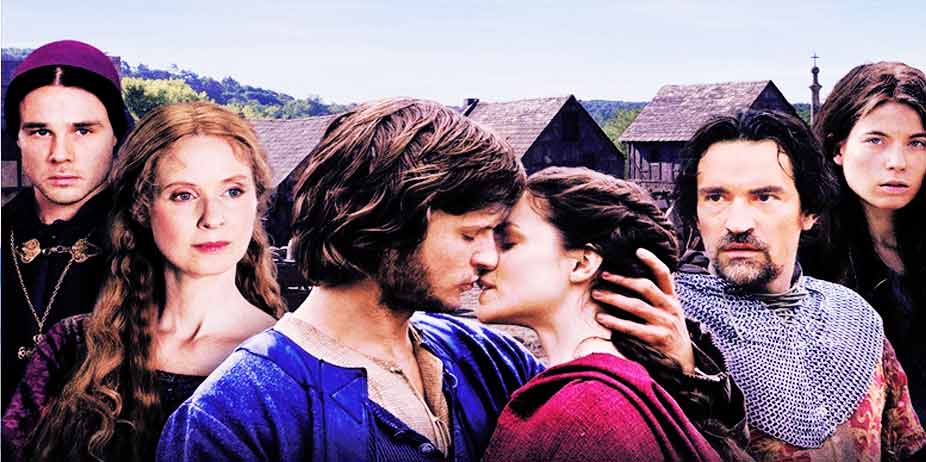
A World Without End (2012)
Best-selling author Ken Follett is known for his sprawling epics set in the middle ages. This eight hour miniseries differs drastically from the novel on which it is based, moves much too quickly and has too many characters, and contains enough problematic content to shy away more cautious viewers.
In 1333, England is in upheaval over the defeat and murder of King Edward by his wife, Queen Isabella. Her merciless leadership causes all who once stood for the king to be under suspicion of treason. The Earl of Shiring is arrested but the lives of his two sons are spared. Ralph (Oliver Jackson-Cohen) becomes the squire of the new earl, while Merthin (Tom Weston-Jones) is apprenticed to a builder. Merthin is in love with Caris (Charlotte Riley), the daughter of a local nobleman who is also sentenced to death. But the conniving manipulations of his diabolical sister, Pentranilla (Cynthia Nixon) purchases his life, if not the use of his legs. Eager to keep his family in good standing, Caris' father arranges for her marriage to an older man.
Desirous of obtaining the funds to attend Oxford and learn medicine, Caris' ambitious cousin Godwyn (Rupert Evans) is distraught when the wrong answer to a medical question asked by the influential Mother Cecelia (Miranda Richardson) forces him to remain a novice in the monastery. Soon, however, he sets his sights on a new prize: to be the senior prior among his brothers. Their lives entwine with others in society as a dynasty comes to power, a hundred year war begins, a new addition to the monastery (Ben Chaplin) raises interesting questions about the king's death, and romantic passions unfold that are not always reciprocated.
Certain aspects of this production, such as its cast, are superb (this includes the musical score, production design, and costuming) but the plot moves at such a swift pace and covers so many years, with so many different main and minor characters, it's difficult to keep situations, motivations, and identities straight. It's easy to forget who belongs to who and which person does what. Such figures as Pentranilla are vicious and cruel, but their early reasons for such behavior are never fully explained (later actions are, but not her reasoning in murdering her sister-in-law). It was also tiresome to see so many rape scenes; no leading lady escapes unscathed, although one does slice open her wrists to avoid marrying her would-be-rapist.
True faith is present in a few decent figures, such as Mother Cecelia, but the series doesn't bother to hide where it stands on faith: all the "heroes" and "heroines" are either atheists (such as Caris, who still winds up as a nun and later, as Mother Superior) or live their lives completely absent from God and the Church. The two "nicest" monks are a homosexual couple, and the sweet nun has lesbian tendencies that surface long enough for her to kiss Caris (who for no fathomable reason kisses her back). Most of those who profess faith use it to their own advantage or are villains; for example, one bishop regularly fornicates with his father's wife. Godwyn ruthlessly climbs to power through murder and blackmail, spouting sanctimonious phrases all the while. On the whole, the Catholic Church is depicted as full of hypocrites.
If there can be one good thing said about World Without End, I've rarely encountered such totally detestable villains -- the loathsome, manipulative, murderous Pentranilla, the lust-and-power-driven Godwyn, determined to see his cousin hanged as a witch (he reminds me of Victor Hugo's Frollo in many ways), and the brutal rapist Ralph. It takes a full eight hours to see each of them dealt their just punishment, yet somehow in spite of a satisfactory fate for each one, the audience is left wanting. The sprawling epic explores everything from royal intrigues to the devastating effects of the Black Plague, but does so with such guttural distastefulness that in spite of being emotionally invested (mostly over screaming at the villains), I was relieved to reach the end.
Sexual Content:
10 sex scenes (including 2 rapes, and 3 attempted rapes -- 2 of which involve incest); a monk unlaces a woman's gown and feels her breasts; he lusts after her throughout the series (at one point, out of camera range, he pleasures himself and comes to a climax while talking to her); another monk uses the excuse of an accusation of witchcraft to grope a woman (his hand covers her breast from view); a nun discovers two monks in bed together, who later share flirtatious banter and talk of their "love"; two nuns kiss one another's lips, and talk about how "love" makes such things permissible in the eyes of God.
Language:
Several abuses of Christ's name, some profanities, abuses of deity, and crude terms.
Violence:
Men are hanged and shot with arrows, also stabbed with swords; a woman is hanged for being accused as a witch; a bridge collapses, killing many people; men threaten one another with knives; fist-fights turn bloody; a man throws his pregnant wife down the stairs, killing her; a man bludgeons and stabs his way to power; numerous women are manhandled/nearly raped.
Other:
Though she is not religious, a woman is made the prioress of a monastery/nunnery. While holding this position (and shortly before leaving it) she becomes involved in a sexual relationship with the man she has loved since childhood. Other priests and bishops conduct similar affairs; only a few of them show any real faith.
